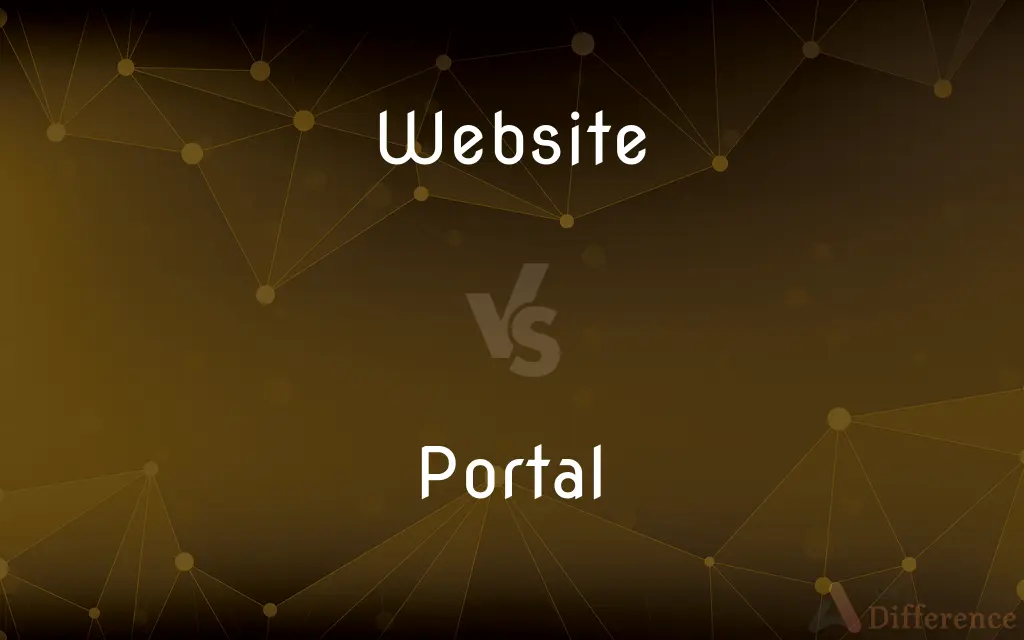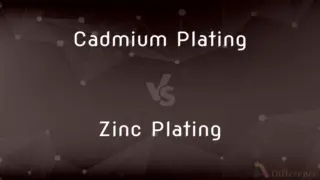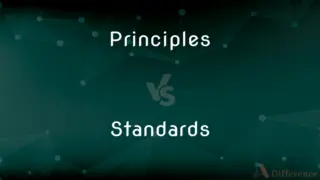Website vs. Portal — What's the Difference?
By Tayyaba Rehman — Published on January 6, 2024
A 'Website' is a collection of web pages linked by a domain, offering information or services. A 'Portal' is a website that aggregates content, services, and resources, often personalized and serving as a gateway to various functionalities.

Difference Between Website and Portal
Table of Contents
ADVERTISEMENT
Key Differences
A 'Website' is a location connected to the internet, hosting web pages containing diverse content, from text and images to multimedia elements. It provides information, services, or products to visitors and functions as an online presence for businesses, individuals, or organizations.
Contrarily, a 'Portal' is a specialized website that acts as a gateway, aggregating information, services, or resources from various sources into a single platform. Portals often offer personalized content, user-specific functionalities, and a central access point to multiple applications or services.
Typically, a 'Website' serves a specific purpose, whether informational, e-commerce, educational, or entertainment, presenting content or services tailored to its audience.
In contrast, a 'Portal' is designed as a multifunctional platform, integrating various tools, services, or resources into a unified interface, providing users with a single point of access to diverse functionalities.
Websites usually focus on disseminating information, presenting content, or facilitating transactions without extensive integration of various external resources or applications.
ADVERTISEMENT
On the other hand, Portals emphasize aggregating content and services from multiple sources, offering users a centralized hub for accessing various tools, applications, or data tailored to their preferences.
Comparison Chart
Function
Presents content or services
Aggregates content, services, and resources
Purpose
Offers information or transactions
Acts as a gateway to multiple tools or functionalities
Integration
Limited integration of external resources
Integrates various tools, services, or data sources
User Interaction
Primarily informative or transactional
Offers personalized content or services to individual users
Focus
Specific to content type or service
Offers a unified interface for multiple functionalities
Compare with Definitions
Website
A collection of web pages providing information.
The company's website showcases its product range.
Portal
Integrates tools or applications.
The business portal connects users to multiple software tools.
Website
An online platform for sharing content.
The website hosts articles on various topics.
Portal
A website aggregating diverse resources.
The news portal compiles articles from various publishers.
Website
A digital space for business representation.
Their website highlights their services and contact details.
Portal
Offers personalized content or services.
The university portal provides student-specific information.
Website
Provides resources for educational purposes.
The educational website offers free courses on coding.
Portal
Acts as a gateway to various functionalities.
The healthcare portal offers access to medical records and appointments.
Website
Offers services such as e-commerce.
The website allows online purchases and transactions.
Portal
Centralizes access to multiple services.
The government portal provides citizens with access to public services.
Website
A set of interconnected webpages, usually including a homepage, generally located on the same server, and prepared and maintained as a collection of information by a person, group, or organization.
Portal
A doorway, entrance, or gate, especially one that is large and imposing.
Website
(Internet) A collection of interlinked web pages on the World Wide Web that are typically accessible from the same base URL and reside on the same server.
You can find complete information about the products on the company's website.
Portal
An entrance or a means of entrance
The local library, a portal of knowledge.
Portal
The portal vein.
Portal
A website considered as an entry point to other websites, often by being or providing access to a search engine.
Portal
Of or relating to the portal vein or the portal system.
Portal
Of or relating to a point of entrance to an organ, especially the transverse fissure of the liver, through which the blood vessels enter.
Portal
An entrance, entry point, or means of entry.
The local library, a portal of knowledge.
Portal
(Internet) A website or page that acts as an entrance to other websites or pages on the Internet.
The new medical portal has dozens of topical categories containing links to hundreds of sites.
Portal
(anatomy) A short vein that carries blood into the liver.
Portal
A magical or technological doorway leading to another location, period in time or dimension.
Portal
(architecture) A lesser gate, where there are two of different dimensions.
Portal
(architecture) Formerly, a small square corner in a room separated from the rest of an apartment by wainscoting, forming a short passage to another apartment.
Portal
A grandiose and often lavish entrance.
Portal
(bridge-building) The space, at one end, between opposite trusses when these are terminated by inclined braces.
Portal
A prayer book or breviary; a portass.
Portal
(anatomy) Of or relating to a porta, especially the porta of the liver.
The portal vein
Portal
To use a portal magical or technological doorway.
Portal
A door or gate; hence, a way of entrance or exit, especially one that is grand and imposing.
Thick with sparkling orient gemsThe portal shone.
From out the fiery portal of the east.
Portal
The lesser gate, where there are two of different dimensions.
Portal
The space, at one end, between opposite trusses when these are terminated by inclined braces.
Portal
A prayer book or breviary; a portass.
Portal
Of or pertaining to a porta, especially the porta of the liver; as, the portal vein, which enters the liver at the porta, and divides into capillaries after the manner of an artery.
Portal
A grand and imposing entrance (often extended metaphorically);
The portals of the cathedral
The portals of heaven
The portals of success
Portal
A site that the owner positions as an entrance to other sites on the internet;
A portal typically has search engines and free email and chat rooms etc.
Portal
A short vein that carries blood into the liver
Common Curiosities
How does it differ from a web application?
A website primarily presents content or services, whereas a web application typically allows user interaction and functionality.
Can a portal be a part of a larger website?
Yes, a portal can be a section within a larger website, offering a centralized access point to specific resources.
Can it encompass multiple pages under a single domain?
Yes, a website often comprises multiple interconnected pages accessible via a common domain.
Does it focus on personalized content?
Yes, portals aim to provide tailored content or services based on user preferences or roles.
Can it include interactive elements?
Yes, websites can contain interactive features like forms, quizzes, or comment sections for user engagement.
Is it suitable for e-commerce purposes?
Yes, websites often serve as platforms for e-commerce, facilitating online transactions.
How does it differ from a search engine?
A portal offers a gateway to various functionalities or resources, while a search engine primarily indexes and retrieves information.
Can it exist without user interactivity?
Yes, some websites purely display static information without interactive features.
Is it restricted to information aggregation?
No, portals can integrate tools, applications, or services besides aggregating information.
Can it be used solely for entertainment?
Yes, websites can focus on entertainment by offering games, videos, or other recreational content.
Can it cater to different language preferences?
Yes, websites often offer multilingual content to serve diverse audiences.
How does it differ from a social media platform?
Portals typically aggregate various tools or services, while social media platforms center on user-generated content and social interaction.
Does it always require user authentication?
No, while some portals may require user login for personalized content, not all portals need authentication for access.
Does it involve content creation?
Portals mostly aggregate existing content but can also include original content creation or publication.
Is it limited to desktop or can it be mobile-friendly?
Websites can be optimized for mobile devices, ensuring accessibility across different platforms and screen sizes.
Share Your Discovery

Previous Comparison
Cadmium Plating vs. Zinc Plating
Next Comparison
Principles vs. StandardsAuthor Spotlight
Written by
Tayyaba RehmanTayyaba Rehman is a distinguished writer, currently serving as a primary contributor to askdifference.com. As a researcher in semantics and etymology, Tayyaba's passion for the complexity of languages and their distinctions has found a perfect home on the platform. Tayyaba delves into the intricacies of language, distinguishing between commonly confused words and phrases, thereby providing clarity for readers worldwide.











































